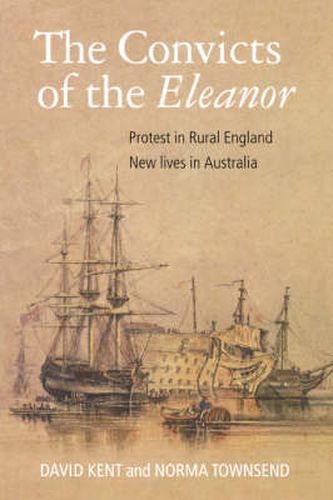Readings Newsletter
Become a Readings Member to make your shopping experience even easier.
Sign in or sign up for free!
You’re not far away from qualifying for FREE standard shipping within Australia
You’ve qualified for FREE standard shipping within Australia
The cart is loading…






This title is printed to order. This book may have been self-published. If so, we cannot guarantee the quality of the content. In the main most books will have gone through the editing process however some may not. We therefore suggest that you be aware of this before ordering this book. If in doubt check either the author or publisher’s details as we are unable to accept any returns unless they are faulty. Please contact us if you have any questions.
This book focuses on the men of the convict transport Eleanor who arrived in NSW in 1831. They were all from the counties of Berkshire, Dorset, Hampshire and Wiltshire and were transported for their part in the Swing riots - the great agricultural uprising of 1830-31. This episode which touched thirty counties and has been called ‘the last peasants’ revolt’ led to more than 480 people being sent to Australia (‘the largest single group in the history of transportation’ (George Rude). The men on the Eleanor who made up 30% of the Swing transportees. Part I of the book deals with the men of the Eleanor in their English setting, Part II with their experiences as convicts and free men in New South Wales. The chapter headings below give a clear indication of the contents of each chapter and the focus of the book on ruined and then reconstructed lives Written with full academic apparatus but with that elusive being the general reader in mind, this theme will appeal to that large readership in England which is interested in rural social history and popular protest. In Australia there is a large and enthusiatic readership for books on colonial history, convictism and works which provide a context for family history. This book also has the advantage of being focussed on Hardy’s Wessex and is thus, to some extent, a contribution to the regional history of southern England. The Swing Riots are a topic which features in the history syllabuses of most examination boards in southern England.
$9.00 standard shipping within Australia
FREE standard shipping within Australia for orders over $100.00
Express & International shipping calculated at checkout
This title is printed to order. This book may have been self-published. If so, we cannot guarantee the quality of the content. In the main most books will have gone through the editing process however some may not. We therefore suggest that you be aware of this before ordering this book. If in doubt check either the author or publisher’s details as we are unable to accept any returns unless they are faulty. Please contact us if you have any questions.
This book focuses on the men of the convict transport Eleanor who arrived in NSW in 1831. They were all from the counties of Berkshire, Dorset, Hampshire and Wiltshire and were transported for their part in the Swing riots - the great agricultural uprising of 1830-31. This episode which touched thirty counties and has been called ‘the last peasants’ revolt’ led to more than 480 people being sent to Australia (‘the largest single group in the history of transportation’ (George Rude). The men on the Eleanor who made up 30% of the Swing transportees. Part I of the book deals with the men of the Eleanor in their English setting, Part II with their experiences as convicts and free men in New South Wales. The chapter headings below give a clear indication of the contents of each chapter and the focus of the book on ruined and then reconstructed lives Written with full academic apparatus but with that elusive being the general reader in mind, this theme will appeal to that large readership in England which is interested in rural social history and popular protest. In Australia there is a large and enthusiatic readership for books on colonial history, convictism and works which provide a context for family history. This book also has the advantage of being focussed on Hardy’s Wessex and is thus, to some extent, a contribution to the regional history of southern England. The Swing Riots are a topic which features in the history syllabuses of most examination boards in southern England.